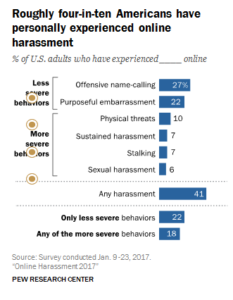Cyber-Harassment and Orders of Protection
If you’ve ever experienced harassment online, you know how nerve-wracking it can be. Harassers can be someone you know or a complete stranger.
In less extreme instances, online harassment develops a shroud of gloom that you are forced to navigate through as you conduct your daily tasks. In more intense circumstances, cyber-harassment can encroach on your privacy, drive you away from certain online resources altogether or during certain times, and may even threaten your physical security.
The Scope of the Issue
According to the Pew Research Center, 41% of American adults have been directly exposed to harassing actions online. In addition, 66% of American adults have recognized these actions aimed at others.

As observed from the graph, “more severe behaviors” don’t occur as frequently as “less severe behaviors” do, but all of these behaviors are a problem to be addressed. Additionally, roughly one-in-five Americans (18%) have been exposed to exceptionally harsh kinds of harassment on the internet. These behaviors include the following:
- Physical threats
- Harassment over a period of time
- Sexual harassment
- Stalking
Where Does cyber-harassment Occur?
Social media platforms can be a breeding ground for online harassers, but that’s not the only place you may encounter abuse. Cyber harassment may be bolstered by the fact that it is so easy to conceal one’s identity on the internet, but harassment can also involve acquaintances, friends, or family members.
Cyber harassment is a serious issue that has the potential to cause significant detriment to your life in the real world. You may experience mental or emotional stress, reputational harm, or you may even become concerned about your physical safety.
Cyber-harassment also has indirect effects. According to the Pew Research Center, about one-fourth of Americans allege they have chosen not to share something online after encountering others being harassed. In addition, one-in-ten Americans have completely abandoned an online service after encountering others employing troublesome actions toward others.
If you believe you have encountered cyber-harassment by your soon-to-be-ex while using the internet, you may be able to obtain an order of protection. In addition, you may also be entitled to financial compensation.
The accomplished attorneys at Wisselman, Harounian & Associates are highly experienced in this area of the law and work hard to obtain justice for clients. Don’t wait to contact us about your case.
Contact Wisselman, Harounian & Associates today at (516) 773-8300 to speak with an attorney about your potential case.



